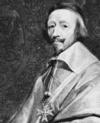Richelieu, Armand-Jean du Plessis, cardinal and duke de
- Richelieu, Armand-Jean du Plessis, cardinal and duke de
-
born Sept. 9, 1585, Richelieu, Poitou, France
died Dec. 4, 1642, Paris
French statesman and chief minister to
Louis XIII.
Born to a minor noble family, he was ordained a priest in 1607 and became bishop of Luçon. As the first bishop in France to implement reforms decreed by the Council of
Trent, he brought order to a diocese ruined by the Wars of
Religion. In 1614 he was elected a deputy of the clergy in the
Estates-General, where he was noted as a conciliatory force. He became an adviser to
Marie de Médicis in 1616 and later councillor to her son, Louis XIII. Named a cardinal in 1622, he served as chief minister from 1624 and became the controlling influence in France's policies. He established royal absolutism in France by suppressing the political power of the
Huguenots and reducing the influence of the nobles. In foreign policy, he sought to weaken Habsburg control of Europe and involved France in the Thirty Years' War. Devious and brilliant, he increased the power of the
Bourbon dynasty and established orderly government in France. He also founded the
Académie Française and rebuilt the Sorbonne.

Cardinal de Richelieu, detail of a portrait by Philippe de Champaigne; in the Louvre, Paris
Giraudon/Art Resource, New York
* * *
Universalium.
2010.
Look at other dictionaries:
Richelieu, Armand-Jean du Plessis, cardinal et duc de — ▪ French cardinal and statesman Introduction , (cardinal and duke of ),byname The Red Eminence , French L éminence Rouge born September 9, 1585, Richelieu, Poitou, Fr. died December 4, 1642, Paris chief minister to King Louis XIII of France… … Universalium
Richelieu, Armand-Jean du Plessis, Duke de — • Cardinal and French statesman (1585 1642) Catholic Encyclopedia. Kevin Knight. 2006 … Catholic encyclopedia
Armand-Jean du Plessis, duc de Richelieu — Philippe de Champaigne: Kardinal Richelieu (um 1637) – Nicht wie ein kirchlicher Machthaber sitzend porträtiert, sondern stehend wie ein weltlicher Fürst … Deutsch Wikipedia
Armand Jean du Plessis — Philippe de Champaigne: Kardinal Richelieu (um 1637) – Nicht wie ein kirchlicher Machthaber sitzend porträtiert, sondern stehend wie ein weltlicher Fürst … Deutsch Wikipedia
Armand Jean du Plessis (Herzog von Richelieu) — Philippe de Champaigne: Kardinal Richelieu (um 1637) – Nicht wie ein kirchlicher Machthaber sitzend porträtiert, sondern stehend wie ein weltlicher Fürst … Deutsch Wikipedia
Armand Jean du Plessis Richelieu — Philippe de Champaigne: Kardinal Richelieu (um 1637) – Nicht wie ein kirchlicher Machthaber sitzend porträtiert, sondern stehend wie ein weltlicher Fürst … Deutsch Wikipedia
Armand-Jean I. du Plessis de Richelieu — Philippe de Champaigne: Kardinal Richelieu (um 1637) – Nicht wie ein kirchlicher Machthaber sitzend porträtiert, sondern stehend wie ein weltlicher Fürst … Deutsch Wikipedia
duke — /doohk, dyoohk/, n., v., duked, duking. n. 1. (in Continental Europe) the male ruler of a duchy; the sovereign of a small state. 2. a British nobleman holding the highest hereditary title outside the royal family, ranking immediately below a… … Universalium
Richelieu, cardinal Armand Jean du Plessis — (1585 1642) First minister of France, Cardinal Richelieu was educated in the Collège de Navarre, Paris, in the military arts and at the Collège de Calvi in theology. He received the bishophric of Luçon in Poitou in 1607, and the cardinalate in … Dictionary of Renaissance art
Duke — /doohk, dyoohk/, n. 1. Benjamin Newton, 1855 1929, and his brother, James Buchanan, 1856 1925, U.S. industrialists. 2. a male given name. * * * I European title of nobility, the highest rank below a prince or king except in countries having such… … Universalium
 Cardinal de Richelieu, detail of a portrait by Philippe de Champaigne; in the Louvre, ParisGiraudon/Art Resource, New York
Cardinal de Richelieu, detail of a portrait by Philippe de Champaigne; in the Louvre, ParisGiraudon/Art Resource, New York